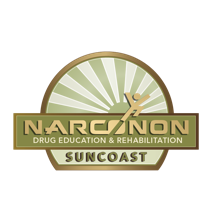At Suncoast Rehab we help many people get off of prescription opioid drugs like OxyContin. Prescription painkillers are extremely popular among those abusing drugs as they are relatively easy to get (often users ask a friend for some or raid a family member’s medicine cabinet.)

In fact, the Centers for Disease Control lists drug overdose as the leading cause of injury death in America. The most common drug type people OD on is prescription medication. The most common type of prescription medication people overdose on? Opioids like OxyContin.
This statistic hasn’t stopped emergency rooms from prescribing these deadly pills. Between 2001 and 2010, emergency departments in the US showed a 49% increase in prescriptions for narcotic painkillers.
What is OxyContin?
OxyContin is an opioid pain reliever. It is made of the drug oxycodone, which is a white, crystalline powder that is made from opium. Other drugs that contain oxycodone include: Percocet, Percodan, Roxicet, Tylox, and Oxycet.
One reason OxyConton specifically has been so popular among drug users because it has an “extended release” function. This means that one pill will have a day’s worth of oxycodone. OxyContin is designed to break down slowly in the stomach, over time.
For a long time, people abusing Oxy could just crush tablets and snort them in order to receive a whole day’s worth of the medication. Now there is an abuse-prevention function which turns the pill to a mush when crushed. It can’t be snorted anymore, but it can be crushed and then taken orally or dissolved and taken intravenously.
Even though OxyContin is a prescription drug, it gets sold in places besides the doctor’s office or the pharmacists. This drug is known on the streets under names like: Cotton, 40s, 40-Bar, Oxy, OC, Kickers, Blue, Oxy 80s, Killers, or 80s.
Effects of OxyContin
Any drug has the effects that it’s prescribed for as well as other – less desirable – effects. Often, these less desirable effects are called “side effects.” However, some side effects are just as common as the intended effects.
Here are several effects that can occur when an individual takes OxyContin on prescription. In other words, these are effects that can happen even if you are legally prescribed this drug and you take it according to doctor’s orders:
- Pain relief

- Euphoria
- Drowsiness or nodding off
- Headache
- Extremely itchy skin or rash
- Low energy or feeling of weakness
- Constipation, nausea, vomiting, diarrhea
- Feeling feverish
- Uncontrolled twitching or difficulty controlling muscles
- Low blood pressure
- Insomnia or nightmares
- Anxiety, confusion, agitation, or nervousness
- Depression, amnesia,
- Feelings of unreality
- Inability to control one’s emotions
- Hallucinations
- Infertility
- Rapid or slowed heartrate
- Difficult breathing
- Anorexia
- Addiction
- Seizures
- Overdose or death
Again, these are effects that can occur even when taking OxyContin according to your prescription.
Why is Oxy Addictive?
Opioids like OxyContin are both physically and mentally addictive. This is because they attach to certain parts of your nervous system and brain. The effect opioids have on the human system is to kill pain and to cause pleasure in place of the pain. This means that the brain associates taking the drug with feelings of joy and fulfillment. These feelings are caused by a flood of neurotransmitters or brain chemicals.
The amount of brain chemicals brought into action by OxyContin is much more than one would experience naturally. This means the feeling of pleasure comes at a price. When the drug wears off, the brain has to reset as it has used way more of its chemicals than is natural. To compensate, the brain produces much lower levels of these pleasure chemicals.
The person taking Oxy will feel a crash come on after their high. This encourages the user to take even more of the drug, in order to maintain the euphoria. When the drug is taken over and over, the user becomes dependent upon OxyContin to feel good – or even just to feel normal.
If you or someone you know is suffering from addiction to prescription painkillers, opiates like heroin, or any other substance, we can help. We work diligently every day to help people work through their addiction and lead healthy, happy, drug-free lives. Contact us today at 877-850-7355.
Refs: CDC.gov, OxyWatchDog.com, RXlist.com, Medicinenet.com, Cesar.UMD.edu, Medterms.net, Drugs.com, Webmd.com
